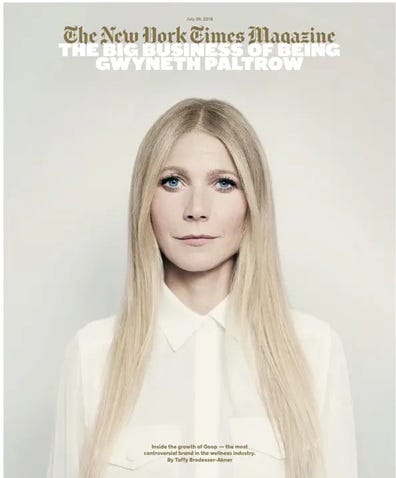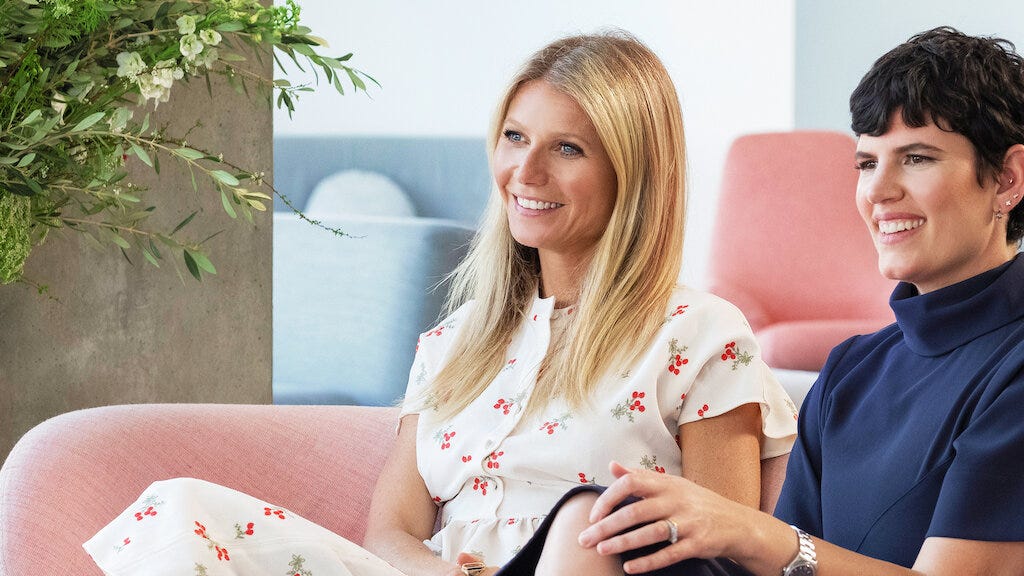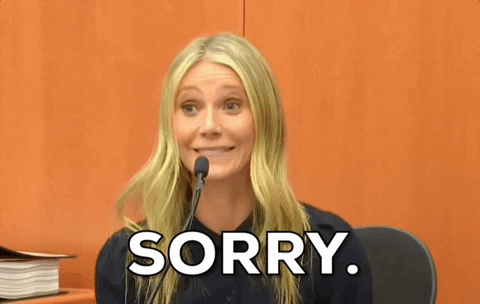Issue 21: Gwyneth Paltrow, GOOP, and the Celebrity Wellness Nightmare
Gywneth will always be Gwyneth, for better or worse (mostly worse)
Gwyneth Paltrow doesn’t act much these days. Despite being an Oscar winner, she’s put her acting career aside to focus on the wellness behemoth that is Goop. Aside from contractually mandated cameos as Pepper Potts in the MCU, she hasn’t been in a film or TV project, major or otherwise, since the forgotten Ryan Murphy Netflix series The Politician. That will change this year as Paltrow returns to cinema with a supporting role in Marty Supreme, a sports comedy biopic about ping pong player Marty Mauser. Any film starring the current wunderkind of Hollywood, Timothée Chalamet, is bound to attract some attention, and Gwyneth's involvement has brought with it some undoubtable intrigue. This is mostly because she's playing Chalamet's love interest.
In anticipation of Marty Supreme, Paltrow is already on the promotional circuit and is this month’s cover star for Vanity Fair. The whole piece is, well, very Gwyneth. She talks about her sex scenes with Chalamet in Marty Supreme and feeling stifled by the use of an intimacy coordinator. There are some interesting quotes about her family and still-close relationship with ex-husband Chris Martin. Her defence of Goop following staff cuts is a bit Trump-esque ("My business is a good business and it’s a strong business and the brand is strong…Case in point, we’re still here. We just had our best year.”) Nothing about it will change your opinions of Paltrow.
My relationship with Paltrow is largely one of tedium and aggravation but with undeniable tinges of pathos and fascination. There’s nobody else in the industry like her, even though she’s inspired countless copycats and a whole new era of the celebrity branding phenomenon. She’s an oft-underrated actress and frequently charming talk-show presence who has been through the wringer at the hands of a notorious abuser. She’s also a purveyor of quackery and pseudo-science who has helped to perpetuate dangerous medical misinformation for the purposes of profit.
Few celebrities are truly divisive in the way that she is. My instinct is to dismiss her out of hand because of the Goop of it all, but even amid her most self-aggrandizing interviews, I cannot help but be drawn to certain aspects of her. So, following the Vanity Fair piece, I, of course, had to turn to her profile with The New York Times.
The New York Times Magazine. "How Goop’s Haters Made Gwyneth Paltrow’s Company Worth $250 Million." July 25, 2018. Taffy Brodesser-Akner.
(Image via NYTimes.com)
You know it's a big story when they bring in Taffy to cover it. She's one of the best celebrity profile writers out there (although she seems to have largely retired that work in favour of novels and TV.) Her Tom Hiddleston GQ piece is legendary and her Bradley Cooper profile (which I covered in a pre-Substack issue of GRC) is one of the best examples of how to navigate an unwilling subject and make lemonade out of lemons. Akner’s work is very funny but with a merciless streak. She gives her subjects just enough rope to hang themselves with but she’s not snarky or cruel. Plus she seemed to actually enjoy writing this work and took talking about the frivolities of celebrities as seriously as it needed to be. This made her a good fit to talk to Paltrow, who revealed herself in this piece to be a big old troll.
The piece opens with Paltrow at Harvard Business School, where students were there ready "interrogate Paltrow about Goop, her lifestyle-and-wellness e-commerce business, and to learn how to create a “sustainable competitive advantage,” according to the class catalog." The very mention of Harvard is one of those things that acts as a symbol you've "made it." It's class, it's intellect, it's elitism, it's all, well, Gwyneth. Goop was built on the idea of exclusivity and high-end luxury that is, by design, inaccessible to the vast majority of people. That should make it a financial disaster since excluding most people who buy things is generally ill-advised. But Goop, at least at this point in time, is working, and Paltrow is described as having made it work through sheer force of Gwyneth-ness.
To quote Akner:
“Why mass-market a lifestyle that lives in definitional opposition to the mass market? Goop’s ethic was this: that having beautiful things sometimes costs money; finding beautiful things was sometimes a result of an immense privilege; but a lack of that privilege didn’t mean you shouldn’t have those things. Besides, just because some people cannot afford it doesn’t mean that no one can and that no one should want it. If this bothered anyone, well, the newsletter content was free, and so were the recipes for turkey ragù and banana-nut muffins.”
In its original form, Goop was a newsletter where Paltrow would recommend her favourite things and throw in a few recipes. It was free, very readable, and often unintentionally hilarious. Everything she suggested was wildly expensive or so woo-woo that it made her seem like a parody of an out-of-touch movie-star. When Goop became a website, complete with e-commerce, original products, and interviews with various “experts”, that image of Paltrow only grew weirder. It kept expanding, evolving into “a clothing manufacturer, a beauty company, an advertising hub, a publishing house, a podcast producer and a portal of health-and-healing information, and soon it would become a TV-show producer. It was a clearinghouse of alternative health claims, sex-and-intimacy advice and probes into the mind, body and soul.”
“There was no part of the self that Goop didn’t aim to serve," adds Akner. This is partly what made Goop so curious a brand. it was intentionally elitist but expanded in a way that seemed impossible for such a concept. How many jade vagina eggs can you sell to the “masses”? To the Harvard students, Paltrow talked about it all in a combination of CEO buzzwords and wellness lingo: being “cash positive” and “radical wellness.”
(Image via Netflix.)
So, how did Gwyneth find this balance between aspiration and inaccessibility? Taffy says: "When G.P. said “aspirational,” she wasn’t kidding. Her business depended on no one ever being able to be her. Though I guess it also depended on their ability to think they might." It is a one-person kind of operation, despite it being a full corporate entity with multiple employees doing the real work of maintaining Goop. I once read a quote about Walt Disney that said he was so ruthlessly efficient in asserting himself as the almighty king of his brand that many fans acted as though he was hand-sewing every Mickey Mouse plushie himself. Certainly, many people think Disney directed more things than he did, and even now, we call Disney movies by that name and not that of the director. Gwyneth is doing a similar thing. She’s spun this myth that she’s done everything she recommends to her fans. And I do believe she’s used the jade eggs and paid the quacks for advice. For better or worse, Goop is authentic to Paltrow’s very being.
Akner describes the rise of wellness as a phenomenon that came about as the Lean In, "women can have it all" ethos lost its power. "It was a way to reorient ourselves — we were not in service to anyone else, and we were worthy subjects of our own care." Enter yoga at work. CBD oil. Whole Foods. SoulCycle. Kombucha. Non-dairy milks. Crystals.
In this sense, I do think Paltrow was ahead of the game. Wellness evolved into a multi-billion-dollar business in the shadow of Goop. Okay, maybe not every company was offering psychic vampire repellent – yes, really – but macrobiotic diets and yoga retreats and expensive supplements made from mushrooms? That all became mainstream post-Goop. A lot of this is still sold in that aspirational vein that has remained her gluten-free bread and vegan butter, but at a more accessible price. Indeed, it’s now so commonplace that it’s become a tyrannical form of capitalistic hell that confuses buying sh*t with being mentally and emotionally at peace.
(Gwyneth getting a “vampire facial” on The Goop Lab. Image via Netflix.)
How did she make it profitable? Trolling. All publicity is good publicity. Monetizing eyeballs is the name of the game. While I worked on this piece, TheWrap published an investigation into Valnet, a content mill pop culture site conglomerate that I used to work with. It nailed how ruthless harnessing of the ability to piss people off can make you very rich (well, the owners, not the writers who got treated like they were in a sweatshop.) It doesn’t matter if people regret clicking if they’ve already clicked. Rage and earnestness are indistinguishable from one another on the data sheets.
"The weirder Goop went", writes Akner, "the more its readers rejoiced." So, bring on the vagina eggs! The bee sting therapy! The alkaline diets! Sure, with it comes a ton of criticisms from actual scientists, but "every time there was a negative story about her or her company, all that did was bring more people to the site — among them those who had similar kinds of questions and couldn’t find help in mainstream medicine." It’s the, “I’m just asking questions” defence: proud ignorance in the guise of curiosity.
But this trolling and the impossible standard it has helped to create in the new era of modern woman wellness also clearly weighs on Akner. She sums up the quandary so brilliantly and so succinctly: "I thought about the word “aspiration,” how to aspire seems so noble, but how aspiration is always infused with a kind of suffering, and I smoked another cigarette." It's the endless hustle of wellness culture that gets to her (and to me, honestly.) Companies like Goop are so powerful because they have found a way to glamourise the endless and unwinnable struggle of "aspiration", and monetize every step of it. As Taffy notes, "We are doomed to aspire for the rest of our lives. Aspiration is suffering. Wellness is suffering. As soon as you level up, you greet how infinite the possibilities are, and it all becomes too awful to live without."
The wellness industry was estimated by Bloomberg to be worth over $6.3 trillion in 2023. This catch-all term for alternative treatments, skincare, supplements, woo-woo, and outright quackery has become an indomitable capitalistic force. It's also become politically terrifying, blending together tradwife propaganda, QAnon conspiracies, and anti-vaxxers. Anti-medical misinformation is disgustingly prevalent and overpowered by a corporate force that benefits from a scared populace.
I don’t think Paltrow started Goop as some nefarious scheme against vaccinations and pasteurised milk. I do, however, believe that she knew the financial and personal benefits in milking her contemporaries’ scepticisms and post-Andrew Wakefield hysteria over traditional medicine to bolster her version of wellness. It’s one where reasonable ideas – eat well, exercise, meditate – were placed alongside total bullsh*t.
(More Goop Lab crap.)
As Taffy details, by 2014 the newsletter "began to resemble the thing it is now, a wellspring of both totally legitimate wellness tips and completely bonkers magical thinking: advice from psychotherapists and advice from doctors about how much Vitamin D to take (answer: a lot! Too much!) and vitamins for sale and body brushing and dieting and the afterlife and crystals and I swear to God something called Psychic Vampire Repellent, which is a “sprayable elixir” that uses “gem healing” to something something “bad vibes.”"
And, of course, shilling quackery puts you at odds with both reality and business. Goop had signed a deal with Conde Nast for a physical magazine, but the plug was pulled after only a couple of issues. "Somewhere like Condé, understandably, there are a lot of rules,” explained Paltrow. Said rules, added Akner, were things like fact-checking and not being part of a "contextual commerce" strategy - meaning that Vogue, for example, can't use its own magazine to sell Vogue products. “We’re never making statements,” Paltrow claimed, which is some peak "but I'm not touching you" lawyer speak, right?
Goop had already faced many issues from groups like he Council of Better Business Bureaus and TruthInAdvertising.org (TINA) over false and deceptive marketing claims. Dr. Jen Gunter, a gynecologist and reproductive health expert, had criticised Goop dozens of times on her own website. Gunter cited many of Goop’s greatest hits: “Tampons are not vaginal death sticks, vegetables with lectins are not killing us, vaginas don’t need steaming, Epstein Barr virus (E.B.V.) does not cause every thyroid disease and for [expletive] sake no one needs to know their latex farmer; what they need to know is that the only thing between them and H.I.V. or gonorrhea is a few millimeters of latex, so glove that [expletive] up.”
And Paltrow proudly said she could monetize all of this. At the Goop Summit, which Akner attends, "There was nothing that couldn’t be healed." Every "expert" there (usually someone bragging about how they don't have any traditional medical qualifications) had a new diagnosis for Akner, and just the thing to fix it for the right fee. Did you know that flat feet is the result of one of your past lives having had their feet cut off as punishment for a crime? Well, now you do.
If there’s one thing I do appreciate about Paltrow, the one area where she has a lot of candour and pathos, it’s in the way she discusses her complicated feelings about Harvey Weinstein. In the mid-1990s, Paltrow was crowned the “Queen of Miramax” by the convicted rapist. Her status as a rising star of impeccable lineage who earned multiple comparisons to Audrey Hepburn was a huge part of Miramax’s narrative during this time. They positioned her as a movie icon of their own making, not unlike the studio system of old which shaped bright unknowns into legends (although Paltrow, being the daughter of an actress and a TV writer, wasn’t entirely moulded in this manner.)
But it wasn't Weinstein who chose Paltrow to play the title role in the Austen adaptation Emma. That was writer-director Douglas McGrath's choice. But Harvey still meddled and insisted that Paltrow first appear in a rubbish David Schwimmer rom-com called The Pallbearer before he would greenlight Emma. It was a big hit and made Paltrow one to watch. Sliding Doors, another Miramax film where she did an English accent, followed, which was also a commercial hit. Then there was Shakespeare in Love, for which she won Best Actress. The Shakespeare in Love Oscar domination is perhaps the true zenith of Harvey Weinstein’s career, that signal of his brutish prowess in accruing money, power, and kudos, and the undeniable confirmation that he had rewritten the rule book of awards seasoning.
(Image via Giphy.)
Paltrow’s Oscar win has long been controversial. Many felt she won it because of the campaigning rather than her performance, and was nowhere near on the same level as fellow nominees Cate Blanchett and Fernanda Montenegro. I don’t disagree, to be honest. She is very good in Shakespeare in Love, and critics heralded her for a reason, although I personally prefer the more brittle and dry Gwyneth performances, like The Royal Tenenbaums. But the Weinstein of it all was always tough to deny, even before we knew the full extent of his cruelty and manipulations.
Paltrow opens up in the NYT piece about becoming a source for the paper’s investigation into Weinstein’s abuses. She describes her dynamic with Weinstein during this period as being a classic domestic abuse situation. During production of Emma, Paltrow says that Weinstein made unwanted sexual advances towards her. She told her then-boyfriend Brad Pitt about this, and he reportedly confronted Weinstein at an event (but still went on to work with him, even after Angelina Jolie told him about her own experiences with the producer, because Brad Pitt can go rot.)
Said Paltrow, "The one time that Harvey propositioned me was really almost the least of it in terms of how onerous that relationship was, and it was very quid pro quo and punitive, and I always felt like I was on thin ice, and he could be truly horrible and mean and then be incredibly generous."
This is all that’s said about Weinstein in this extensive piece, but I think her succinctness is to her benefit. She gets across a lot about her tangled emotions in one paragraph. In a later interview, Paltrow got even more candid about her complicated feelings on Weinstein. As she told Andrew Ross Sorkin:
"He was a very, very important figure in my life. He was my main boss. He gave me incredible opportunity and yet during that time we had a very, very fraught complicated relationship. Highs and lows. And the postscript to that chapter of my life is where it gets extremely complicated for me, because the information came to light about who he was and how he was behaving that I didn’t know during my already very difficult time with him. So I’m not sure. I’m not sure how I feel."
She got some flack for this but I think her raw honesty on how this man who undeniably impacted her life and career continues to loom like a shadow over her future is laudable. It's hard work to parse out decades of complicated emotions and the experience of being a victim, especially of a man who is now the worldwide face of monstrous abusers. Whenever she talks about Weinstein, I get the sense that she feels she may never fully escape his shadow. Her acting career and Oscar win will, to many, be forever accompanied by an asterisk. In that interview, she also admitted to reading a Wesley Morris article on her where he wondered "whether Paltrow's taste for acting had diminished because of that man, whether having his company seem synonymous with some of her strongest, most popular work compelled her to start a company of her own, one where the work concerned not acting but being, being whole, being better, being ridiculously better." Paltrow said "I think he's right."
Paltrow as a woman escaping this dark past and hoping to make something for herself independent of her supposed Svengali is something I deeply empathise with. It’s all the other stuff that proves tough to stomach. In that recent Vanity Fair piece, she doesn’t explicitly endorse Robert F. Kennedy Jr., but you can see her tiptoeing towards the antivaxx “make America healthy again” bandwagon. Politically, Paltrow has described herself as an “independent thinker,” which means she's a centrist who turned Republican for Rick Caruso. But it's hard to not think of her as a little bit Trumpy when she talks up raw milk and panics about supposed carcinogens in her food. "Paltrow seems to avoid naming Kennedy himself, saying she doesn’t subscribe to any one leader in her personal concerns about the US health system, instead seeking to educate herself," says the article. It just echoes what we saw in that New York Times piece, that same willingness to uncritically elevate woo-woo and claim you're just being an independent thinker.
Goop is still very Goop-esque. You can buy a Goop-branded double-sided wand vibrator from their shop for $98. There's advice on "how Venus Retrograde" can help you slow down with advice from a "psychological astrologer." The full package of Goop branded skincare can be purchased for $565. I do wonder if Goop will see a rise in business in the Trump/MAHA/brainworm Kennedy age, where measles outbreaks are back in fashion and people are rubbing beef tallow on their faces. I’m not sure how compatible that is with Paltrow’s brand of monied aspiration but it’s not as though it’s hard to make rich people part with their money for dumb sh*t pushed by celebrities.
Akner gets to the end of her profile, exhausted and elated but also not embracing the Paltrow ethos. She found her subject to be very poised and charming but the world of reiki and past lives and supplements did not win her over. It just made her more aware of how the goalposts are always moving, particularly for women. The fantasy of having the answers to all of our problems is a mighty one, but the promised solution being crystals and jade eggs? As Akner ends the piece when asked by her sister how the experience was, “It was ridiculous.”
(Image via Giphy.)
Thanks for reading. You can find my work scattered across the internet. On Pajiba, I talked about the Chinese animation box office record breaker Ne Zha 2. For Inverse, I wrote about one of the scariest films I’ve ever seen, The Changeling. I reviewed Emily St. James’ wonderful novel Woodworking for Paste. I was a guest on the podcast Exiting Through the 2010s, where I talked about a movie I love, Lucrecia Martel’s Zama.
If you feel like throwing me a few quid to help keep up this newsletter (and buy more bookshelves for my flat), I have a Ko-Fi account.










You and Taffy are both gems!
For some unknown reason, I read every single thing that mentions Gwyneth. She's so cool and so interesting to me. No clue why. However, her life does not seem to have much joy. It's beautiful and luxurious, but happy happy? Nope.